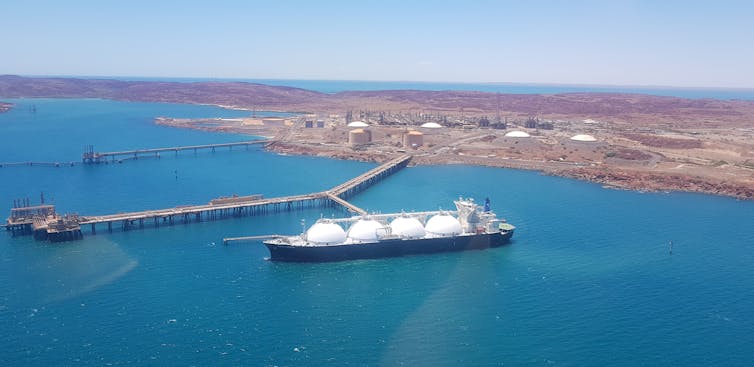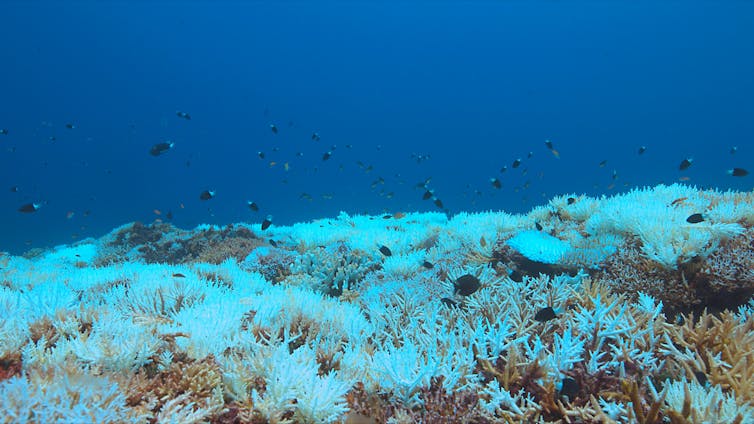A major new climate case to stop Woodside’s controversial Scarborough gas project going ahead has been filed by the Australian Conservation Foundation (ACF) in the federal court this week. ACF lawyers argue that the potential for the project’s emissions to harm the Great Barrier Reef must be assessed.
While the case has only just begun, as legal experts, we see this as a landmark challenge.
Gas is often presented as a “transition fuel” towards a green economy. Woodside argues the Scarborough development will help to reduce global emissions by replacing coal with “cleaner” gas. But scientists say gas must rapidly exit the global power sector to keep the Paris Agreement’s 1.5℃ temperature goal in reach.
Indeed, a 2021 study found if the full Scarborough-Pluto project goes ahead, it’ll release over three times Australia’s current annual emissions.
ACF’s case against Woodside will be an important test of Australia’s new climate credentials. It will also fundamentally confront the question: what role, if any, will gas play in the energy transition?

The next frontier of climate litigation is gas
Australian climate lawyers are no stranger to challenging approvals for coal mines in the country. The ACF’s case brings similar strategies to the Scarborough gas project.
Woodside’s Scarborough-Pluto gas project proposes to drill and pipe gas from off the coast of Western Australia, mainly to supply natural gas to countries in Asia.
The company has said their oil and gas projects are consistent with their science-based, Paris-aligned reduction targets for scope 1 and scope 2 emissions, which include emissions directly released from the project, such as leaking methane. But this doesn’t include the scope 3 emissions, which are associated with burning gas by overseas customers.
As the 2021 study concluded, the Scarborough gas project will cause an estimated 1.37 billion tonnes of cumulative emissions by 2055.
Despite these potentially significant climate change impacts, the Scarborough gas project has never been approved under Australia’s environmental protection law, the EPBC Act.

This is because Australian law allows all offshore gas and oil projects to be assessed under a streamlined process by the offshore regulator, the National Offshore Petroleum Safety and Environment Management Authority. The EPBC Act also doesn’t include a “climate trigger” requiring the climate change impacts of projects to be assessed.
Lawyers for the ACF will argue the project is likely to have significant impacts on the heritage values of the Great Barrier Reef.
They’ll point to the broader carbon footprint of the project, arguing the burning and consumption of the gas in other countries will increase greenhouse gas emissions in the atmosphere, thereby increasing global average surface temperature, and increasing the risk of mass coral bleaching in the Great Barrier Reef.
Until an environmental impact assessment has taken place, lawyers say Woodside must be restrained from developing the Scarborough gas project.
An uphill battle?
The ACF’s case has only just begun and will likely encounter headwinds in efforts to make out its novel claim.
Last year, we saw the disappointing result in the Sharma case, where the federal court unanimously overturned a finding that the federal environment minister owed Australian children a duty of care to prevent harm from emissions caused by approving a coal extension project.
Indeed, other challenges to the Scarborough gas project in the WA supreme court have not found success, nor have challenges to another gas project, Narrabri, in NSW.
But the ACF case takes a different tack. It uses an application for an injunction to allow evidence be given about how the Scarborough project impacts the environment. On the other hand, previous challenges to the Scarborough gas project focused on the decision-making process.
And in recent years there have also been other notable cases in the Rocky Hill litigation and the KEPCO mine, where the courts have refused to approve new fossil fuel developments on environmental grounds.
Between a climate crisis and an energy crisis
The ACF’s case against Woodside’s Scarborough gas project is linked to much broader tensions between the need for urgent climate ambition, the global and domestic energy crisis, and arguments around needing gas as a transition fuel.

Globally, the validity of gas as a transition fuel is being tested.
Last year, the International Energy Agency published a pathway for the planet to reach net zero emissions by 2050. Under this pathway, there would be “no new oil and gas fields approved for development […] and no new coal mines or mine extensions”.
Read more: 4 reasons why a gas-led economic recovery is a terrible, naïve idea
And this month, Climate Analytics published analysis saying gas “must exit electricity generation rapidly after coal – as early as 2035 in rich countries, and by 2040 for the rest of the world – to keep the Paris Agreement’s 1.5℃ limit in reach”.
Even Woodside’s own investors are questioning the company’s pathway in the transition to net zero, with nearly 50% of shareholders voting against its climate report, as it lacked detail and overly relied on carbon offsets.
At the same annual meeting, though, Woodside’s shareholders voted resoundingly in favour of the company’s merger with BHP’s petroleum arm. This cemented BHP’s move away from fossil fuels, and significantly increased Woodside’s oil and gas portfolio.
If the ACF case succeeds, it’s likely to be harder for future gas projects of this scale to be approved.
Beyond any courtroom result, cases such as the ACF’s challenge raise public awareness and conversations among policymakers about the future trajectory of the clean energy transition in this country. And this case could break new ground.
Jacqueline Peel receives funding from the Australian Research Council for a Discovery Project on Advancing Investor Action on Energy Transition (2022-2024).
Ben Neville receives funding from the Australian Research Council for a Discovery Project on Advancing Investor Action on Energy Transition (2022-2024).
Rebekkah Markey-Towler is undertaking a PhD associated with funding from the Australian Research Council for a Discovery Project on Advancing Investor Action on Energy Transition (2022-2024).
This article was originally published on The Conversation. Read the original article.







